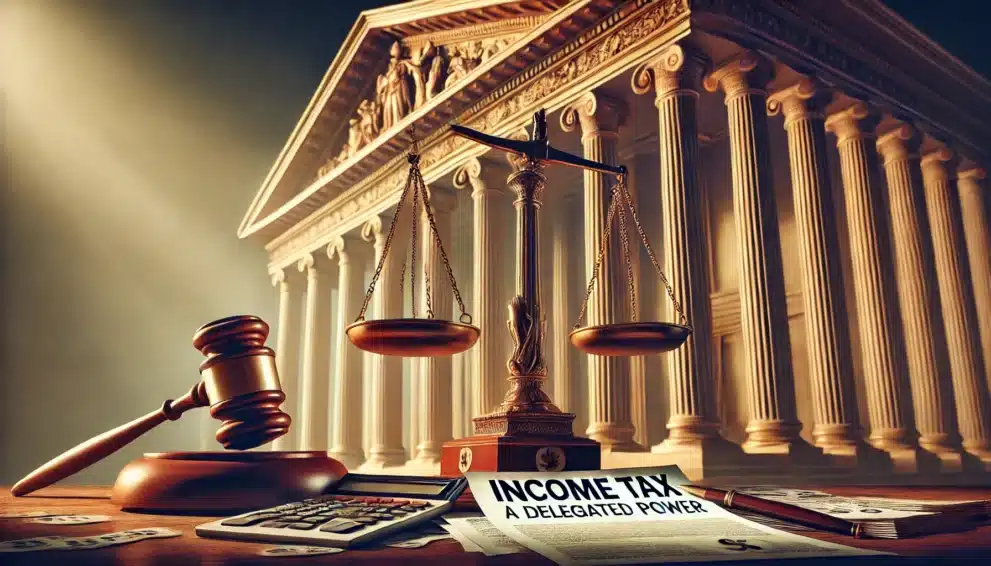
A delegated power is an authority that a governing body grants to another entity to perform specific functions. In the U.S. Constitution, delegated powers refer to those explicitly assigned to the federal government, differentiating them from the reserved powers left to the states. These powers are essential in maintaining a structured system of governance, ensuring that responsibilities are clearly defined among different levels of government.
The Constitution outlines delegated powers primarily in Article I, Section 8, granting Congress the ability to regulate commerce, levy taxes, coin money, declare war, establish post offices, and create laws necessary for governance. These powers allow the federal government to maintain order, provide national defense, and regulate economic activities. Delegated powers are essential for creating a functioning national government that can address broad and complex issues that individual states may not be equipped to handle independently.
Delegated powers fall into three primary categories. Expressed powers are those explicitly written in the Constitution, such as the ability to impose tariffs, negotiate treaties, and regulate interstate commerce. Implied powers are not directly stated but are necessary for carrying out expressed powers. The Necessary and Proper Clause, also known as the Elastic Clause, allows Congress to expand its authority when needed, such as creating a national bank to manage government finances. Inherent powers arise from the federal government’s sovereignty, enabling it to conduct foreign affairs, acquire territory, and regulate immigration, even though these actions are not explicitly mentioned in the Constitution.
Throughout history, delegated powers have been a subject of debate, particularly concerning the balance of power between federal and state governments. Landmark Supreme Court cases such as McCulloch v. Maryland (1819) reinforced the concept of implied powers by upholding Congress’s authority to establish a national bank under the Necessary and Proper Clause. Other cases, such as Gibbons v. Ogden (1824), clarified the scope of Congress’s power to regulate interstate commerce.
The interpretation of delegated powers continues to evolve based on shifting political, economic, and social contexts. The expansion of federal authority during the New Deal era, civil rights legislation, and national security measures have all tested the limits of these powers. Debates persist over whether the federal government should take on greater responsibilities or whether certain powers should be returned to state control. Understanding delegated powers is essential for analyzing the distribution of authority, the role of federalism, and the ongoing evolution of constitutional law in the United States.
Income tax is a delegated power because the authority to levy and collect taxes is explicitly granted to the federal government by the U.S. Constitution. Article I, Section 8 states that Congress has the power to lay and collect taxes, duties, imposts, and excises to provide for the common defense and general welfare of the United States. This power ensures that the federal government can generate revenue necessary for funding public services, maintaining infrastructure, and supporting national programs. However, the original Constitution required that direct taxes be apportioned among the states based on population, which made it difficult for the federal government to impose a nationwide income tax.
Before the creation of federal income tax, the U.S. government primarily relied on tariffs, excise taxes, and land sales to fund its operations. During the Civil War, the federal government introduced a temporary income tax in 1861 to finance war expenses. This tax was later repealed, and for several decades, the government continued to depend on indirect taxes, which disproportionately affected lower-income individuals because they increased the cost of goods rather than taxing earnings directly.
In 1894, Congress attempted to establish a peacetime income tax through the Wilson-Gorman Tariff Act, but the Supreme Court ruled it unconstitutional in Pollock v. Farmers’ Loan & Trust Co. (1895), arguing that direct taxes had to be apportioned among the states. This decision severely limited the federal government’s ability to impose an income tax, leading to growing concerns over tax fairness and revenue generation.
The issue was resolved with the ratification of the Sixteenth Amendment in 1913, which explicitly granted Congress the power to levy an income tax without apportionment among the states. This amendment gave the federal government the ability to tax individual and corporate earnings directly, creating a stable and flexible source of revenue. With the passage of the Revenue Act of 1913, the federal government officially implemented a progressive income tax system, requiring higher earners to pay a larger percentage of their income.
Income tax remains a delegated power because it is granted directly to the federal government through the Constitution and the Sixteenth Amendment. This means that the authority to impose income tax is not reserved for the states but is instead exercised by Congress. Although states also have the ability to impose their own state income taxes, the federal income tax is separate and operates under laws established by the Internal Revenue Code.
The income tax system plays a crucial role in economic policy, public funding, and government operations. Federal tax revenue is used to support essential programs such as Social Security, Medicare, national defense, education, and infrastructure development. The income tax also allows for progressive taxation, meaning that individuals with higher earnings contribute more, ensuring that government resources are distributed in a way that supports both economic growth and public welfare.
Because income tax is derived from an explicit constitutional amendment, it is considered an expressed power within the broader category of delegated powers. Congress has the authority to adjust tax rates, create tax exemptions, and modify tax regulations through legislative action. However, tax laws are frequently debated and revised, reflecting changes in economic conditions, political priorities, and public policy objectives. The authority to impose and regulate income tax remains one of the most significant financial powers of the federal government, shaping national economic policy and influencing the overall structure of government revenue collection.



 Share
Share Tweet
Tweet Share
Share




Comment